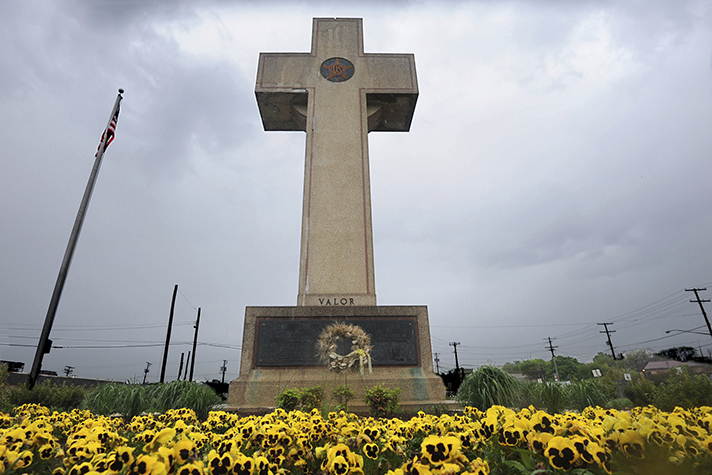
The Billy Graham Evangelistic Association has jointly filed an amicus curiae brief with the Supreme Court, urging the high court to reverse a prior decision that a cross-shaped war memorial violates the separation of church and state.
Built in 1925, the almost 40-foot tall cross was created to honor 49 fallen World War I soldiers. Private citizens funded the marble and cement cross that now sits at a busy junction in Bladensburg, Maryland, just seven miles or so from Capitol Hill. The monument drew the attention of the American Humanist Association, and in 2014 the anti-religious group sued, claiming the historic memorial was unconstitutional because of its shape and its location on now state-maintained lands.
Lower courts agreed with that thinking, but the American Legion appealed, disagreeing with their reasons why and the precedent they used. The Supreme Court accepted the case, and arguments are expected to begin in late February.
“I’m thankful that our Supreme Court has agreed to take this case,” Franklin Graham said last November in a Facebook post. “They will be deciding whether to reverse a lower court ruling that the memorial was unconstitutional and should be removed. Let’s pray for wisdom for the Supreme Court as they hear this case and others like it that are so important to religious freedom and the future of this nation. Pray that they will disallow hostility towards faith and uphold historic constitutional protections in our country.”
Amicus curiae means “friend of the court.” BGEA decided to support this amicus brief—a legal document filed by a person or group that is not a party to the case, but who is concerned about the matter—because the outcome will have an impact on the future of religious liberties in America. Chief among those is our right to worship freely, including acknowledging Christ even while serving our country. The brief argues that our Founders didn’t just think these rights were critical for individuals, but for society as a whole.
“The Founders understood that religious beliefs and ethical principles provided a foundation for, and helped the preservation of, the type of government that they had set up in the Constitution,” the brief states. “In this way, these enactments and practices served a critical, secular, governmental purpose.”
Take for instance Samaritan’s Purse, which also supports this brief. The ministry steps in after natural disasters all over the world, but particularly here in the United States, to help people rebuild their homes. Without the ministry’s service and the support of its faithful donors, the government would have to field a lot more of the recovery effort.
>>Read the Amicus Brief Filed by BGEA, Samaritan’s Purse & Others
“Ultimately the case is about whether the court will recognize the vision of the Founders that the Constitution was intended to protect and encourage the free exercise of religion, or does the First Amendment now mean something different,” BGEA General Counsel Justin Arnot said in early January from the ministry’s Charlotte, North Carolina, headquarters.
The First Amendment:
Congress shall make no law respecting an establishment of religion, or prohibiting the free exercise thereof; or abridging the freedom of speech, or of the press; or the right of the people peaceably to assemble, and to petition the Government for a redress of grievances.
—United States Bill of Rights
“Sometimes people want to cast off old ideas that don’t seem to serve their immediate goal, without understanding the extent to which they are hurting themselves. There is great wisdom in the Founders’ vision. If we’re not free as Christians to express our faith in every sphere of life, which is what following Christ requires, then we’re not free at all. Cases like this could really impact every First Amendment right, not just religion.”
A ruling against the cross could have long-term ramifications for people of all faiths who are free to worship in a society once founded upon Christian values. After all, the brief insists, the religion-focused clauses in the First Amendment support freedom, not fear.
“Central to a proper understanding is that both the Establishment Clause and the Free Exercise Clause are pro-religion; the Establishment Clause is not hostile to religion and its exercise,” the brief states. “The Establishment Clause is also pro-marketplace of ideas, recognizing that adults are able to observe, sift, and evaluate ideas without at the same time being forced to adopt them. The clause does not arm the non-religious with a heckler’s veto.”
Nowadays, Arnot said, it seems like society takes its signal from the perceived right not to be offended.
“But that’s not what the Founders envisioned and not what the Constitution protects,” Arnot said. “What they envisioned was a robust First Amendment that includes the freedom of speech and the free exercise of religion, which really are the right to enjoy liberty to the greatest extent. Obviously there are appropriate limits, but the heckler shouldn’t have the power to equip courts to say you can’t do this or you can’t say that because it offends me. When courts get into the business of requiring the removal of even the evidence of the Christian impact on our society to appease hecklers, they are destroying the foundation upon which our system of government rests. Silencing some voices to appease others doesn’t enhance liberty for anyone; it diminishes it for everyone.
“That’s why it’s important for groups like BGEA, who have ministry partners who understand the importance of these issues as well as strong leadership, to speak up and say, ‘This is the way we think you should go. This is what the Founders intended and what preserves liberty.’ That’s the point of an amicus brief. In this case we think it would be a mistake to remove the cross because it represents efforts across the country to remove religion and religious symbolism from the public arena entirely. That impacts our mission and would be disastrous for our country.”
Please pray for the Supreme Court justices hearing this case and for our nation as a whole.
In these turbulent times, you can have peace. Learn more about God’s love for you.


